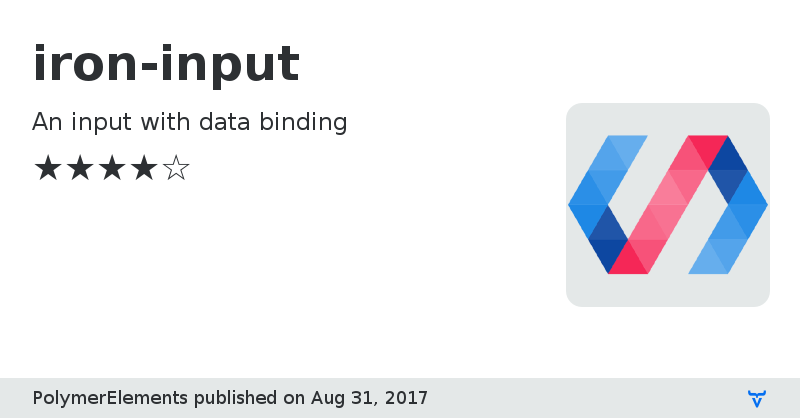iron-input - Vaadin Add-on Directory
An input with data binding
Issue tracker
License
Online Demo
View on NPM
Documentation
View on GitHub
iron-input version 0.8.0
### Dependencies
* polymer#Polymer/polymer#v0.8.0-rc.6
iron-input version 0.8.1
### Dependencies
* polymer#Polymer/polymer#v0.8.0-rc.7
iron-input version 0.8.2
### Dependencies
* polymer#Polymer/polymer#v0.8.0-rc.7
iron-input version 0.8.3
### Dependencies
* polymer#Polymer/polymer#v0.8.0-rc.7
iron-input version 0.9.0
### Dependencies
* polymer#Polymer/polymer#v0.9.0-rc.1
iron-input version 0.9.1
### Dependencies
* polymer#Polymer/polymer#v0.9.0-rc.1
* iron-validatable-behavior#PolymerElements/iron-validatable-behavior#^0.9.0
iron-input version 0.9.2
### Dependencies
* polymer#Polymer/polymer#v0.9.0-rc.1
* iron-validatable-behavior#PolymerElements/iron-validatable-behavior#^0.9.0
iron-input version 0.9.3
### Dependencies
* polymer#Polymer/polymer#v0.9.0-rc.1
* iron-validatable-behavior#PolymerElements/iron-validatable-behavior#^0.9.0
iron-input version 0.9.4
### Dependencies
* iron-validatable-behavior#PolymerElements/iron-validatable-behavior#^0.9.0
* polymer#Polymer/polymer#^0.9.0
iron-input version 0.9.5
### Dependencies
* iron-validatable-behavior#PolymerElements/iron-validatable-behavior#^0.9.0
* iron-form-element-behavior#PolymerElements/iron-form-element-behavior#^0.9.0
* polymer#Polymer/polymer#^0.9.0
iron-input version 0.9.6
### Dependencies
* iron-validatable-behavior#PolymerElements/iron-validatable-behavior#^0.9.0
* polymer#Polymer/polymer#^0.9.0
iron-input version 0.9.7
### Dependencies
* iron-validatable-behavior#PolymerElements/iron-validatable-behavior#^0.9.0
* polymer#Polymer/polymer#^0.9.0
iron-input version 0.9.8
### Dependencies
* iron-validatable-behavior#PolymerElements/iron-validatable-behavior#^0.9.0
* polymer#Polymer/polymer#^0.9.0
iron-input version 1.0.0
### Dependencies
* iron-validatable-behavior#PolymerElements/iron-validatable-behavior#^1.0.0
* polymer#Polymer/polymer#^1.0.0
iron-input version 1.0.1
### Dependencies
* iron-validatable-behavior#PolymerElements/iron-validatable-behavior#^1.0.0
* polymer#Polymer/polymer#^1.0.0
iron-input version 1.0.2
### Dependencies
* iron-validatable-behavior#PolymerElements/iron-validatable-behavior#^1.0.0
* polymer#Polymer/polymer#^1.0.0
iron-input version 1.0.3
### Dependencies
* iron-validatable-behavior#PolymerElements/iron-validatable-behavior#^1.0.0
* polymer#Polymer/polymer#^1.0.0
iron-input version 1.0.4
### Dependencies
* iron-validatable-behavior#PolymerElements/iron-validatable-behavior#^1.0.0
* polymer#Polymer/polymer#^1.0.0
iron-input version 1.0.5
### Dependencies
* iron-validatable-behavior#PolymerElements/iron-validatable-behavior#^1.0.0
* polymer#Polymer/polymer#^1.0.0
iron-input version 1.0.6
### Dependencies
* iron-validatable-behavior#PolymerElements/iron-validatable-behavior#^1.0.0
* polymer#Polymer/polymer#^1.0.0
iron-input version 1.0.7
### Dependencies
* iron-validatable-behavior#PolymerElements/iron-validatable-behavior#^1.0.0
* polymer#Polymer/polymer#^1.0.0
iron-input version 1.0.8
### Dependencies
* iron-validatable-behavior#PolymerElements/iron-validatable-behavior#^1.0.0
* polymer#Polymer/polymer#^1.0.0
iron-input version 0.0.1
### Dependencies
* @polymer/iron-validatable-behavior#^0.0.1
* @polymer/polymer#^1.2.5-npm-test.2
iron-input version 0.0.3
### Dependencies
* @polymer/iron-validatable-behavior#^0.0.3
* @polymer/polymer#^1.2.5-npm-test.2
iron-input version 1.0.9
### Dependencies
* iron-a11y-announcer#PolymerElements/iron-a11y-announcer#^1.0.0
* iron-validatable-behavior#PolymerElements/iron-validatable-behavior#^1.0.0
* polymer#Polymer/polymer#^1.0.0
iron-input version 1.0.10
### Dependencies
* iron-a11y-announcer#PolymerElements/iron-a11y-announcer#^1.0.0
* iron-validatable-behavior#PolymerElements/iron-validatable-behavior#^1.0.0
* polymer#Polymer/polymer#^1.0.0
iron-input version 1.0.11
### Dependencies
* iron-a11y-announcer#PolymerElements/iron-a11y-announcer#^1.0.0
* iron-validatable-behavior#PolymerElements/iron-validatable-behavior#^1.0.0
* polymer#Polymer/polymer#^1.0.0
iron-input version 2.0.0
### Dependencies
* iron-a11y-announcer#PolymerElements/iron-a11y-announcer#1 - 2
* iron-validatable-behavior#PolymerElements/iron-validatable-behavior#1 - 2
* polymer#Polymer/polymer#1.9 - 2
iron-input version 3.0.0-pre.1
### Dependencies
* @polymer/iron-a11y-announcer#^3.0.0-pre.1
* @polymer/iron-validatable-behavior#^3.0.0-pre.1
* @polymer/polymer#^3.0.0-pre.1
iron-input version 2.0.1
### Dependencies
* iron-a11y-announcer#PolymerElements/iron-a11y-announcer#1 - 2
* iron-validatable-behavior#PolymerElements/iron-validatable-behavior#1 - 2
* polymer#Polymer/polymer#1.9 - 2
iron-input version 3.0.0-pre.2
### Dependencies
* @polymer/iron-a11y-announcer#^3.0.0-pre.1
* @polymer/iron-validatable-behavior#^3.0.0-pre.1
* @polymer/polymer#^3.0.0-pre.1
iron-input version 3.0.0-pre.3
### Dependencies
* @polymer/iron-a11y-announcer#^3.0.0-pre.3
* @polymer/iron-validatable-behavior#^3.0.0-pre.3
* @polymer/polymer#^3.0.0-pre.3
iron-input version 3.0.0-pre.4
### Dependencies
* @polymer/iron-a11y-announcer#^3.0.0-pre.4
* @polymer/iron-validatable-behavior#^3.0.0-pre.4
* @polymer/polymer#^3.0.0-pre.4
iron-input version 3.0.0-pre.6
### Dependencies
* @polymer/iron-a11y-announcer#^3.0.0-pre.6
* @polymer/iron-validatable-behavior#^3.0.0-pre.6
* @polymer/polymer#^3.0.0-pre.6
iron-input version 3.0.0-pre.7
### Dependencies
* @polymer/iron-a11y-announcer#^3.0.0-pre.7
* @polymer/iron-validatable-behavior#^3.0.0-pre.7
* @polymer/polymer#^3.0.0-pre.7
iron-input version 3.0.0-pre.8
### Dependencies
* @polymer/iron-a11y-announcer#^3.0.0-pre.7
* @polymer/iron-validatable-behavior#^3.0.0-pre.7
* @polymer/polymer#^3.0.0-pre.7
iron-input version 2.1.0
### Dependencies
* iron-a11y-announcer#PolymerElements/iron-a11y-announcer#1 - 2
* iron-validatable-behavior#PolymerElements/iron-validatable-behavior#1 - 2
* polymer#Polymer/polymer#1.9 - 2
iron-input version 2.1.1
### Dependencies
* iron-a11y-announcer#PolymerElements/iron-a11y-announcer#1 - 2
* iron-validatable-behavior#PolymerElements/iron-validatable-behavior#1 - 2
* polymer#Polymer/polymer#1.9 - 2
iron-input version 3.0.0-pre.10
### Dependencies
* @polymer/iron-a11y-announcer#^3.0.0-pre.10
* @polymer/iron-validatable-behavior#^3.0.0-pre.10
* @polymer/polymer#^3.0.0-pre.10
iron-input version 3.0.0-pre.11
### Dependencies
* @polymer/iron-a11y-announcer#^3.0.0-pre.10
* @polymer/iron-validatable-behavior#^3.0.0-pre.10
* @polymer/polymer#^3.0.0-pre.10
iron-input version 2.1.2
### Dependencies
* iron-a11y-announcer#PolymerElements/iron-a11y-announcer#1 - 2
* iron-validatable-behavior#PolymerElements/iron-validatable-behavior#1 - 2
* polymer#Polymer/polymer#1.9 - 2
iron-input version 3.0.0-pre.12
### Dependencies
* @polymer/iron-a11y-announcer#3.0.0-pre.12
* @polymer/iron-validatable-behavior#3.0.0-pre.12
* @polymer/polymer#3.0.0-pre.12
iron-input version 3.0.0-pre.13
### Dependencies
* @polymer/iron-a11y-announcer#^3.0.0-pre.13
* @polymer/iron-validatable-behavior#^3.0.0-pre.13
* @polymer/polymer#^3.0.0-pre.13
iron-input version 3.0.0-pre.14
### Dependencies
* @polymer/iron-a11y-announcer#^3.0.0-pre.14
* @polymer/iron-validatable-behavior#^3.0.0-pre.14
* @polymer/polymer#^3.0.0-pre.13
iron-input version 3.0.0-pre.15
### Dependencies
* @polymer/iron-a11y-announcer#^3.0.0-pre.15
* @polymer/iron-validatable-behavior#^3.0.0-pre.15
* @polymer/polymer#^3.0.0-pre.13
iron-input version 2.1.3
### Dependencies
* iron-a11y-announcer#PolymerElements/iron-a11y-announcer#1 - 2
* iron-validatable-behavior#PolymerElements/iron-validatable-behavior#1 - 2
* polymer#Polymer/polymer#1.9 - 2
iron-input version 3.0.0-pre.16
### Dependencies
* @polymer/iron-a11y-announcer#^3.0.0-pre.16
* @polymer/iron-validatable-behavior#^3.0.0-pre.16
* @polymer/polymer#^3.0.0-pre.13
iron-input version 3.0.0-pre.17
### Dependencies
* @polymer/iron-a11y-announcer#^3.0.0-pre.17
* @polymer/iron-validatable-behavior#^3.0.0-pre.17
* @polymer/polymer#^3.0.0-pre.13
iron-input version 3.0.0-pre.18
### Dependencies
* @polymer/iron-a11y-announcer#^3.0.0-pre.18
* @polymer/iron-validatable-behavior#^3.0.0-pre.18
* @polymer/polymer#^3.0.0
iron-input version 3.0.0-pre.19
### Dependencies
* @polymer/iron-a11y-announcer#^3.0.0-pre.19
* @polymer/iron-validatable-behavior#^3.0.0-pre.19
* @polymer/polymer#^3.0.0
iron-input version 3.0.0-pre.20
### Dependencies
* @polymer/iron-a11y-announcer#^3.0.0-pre.20
* @polymer/iron-validatable-behavior#^3.0.0-pre.20
* @polymer/polymer#^3.0.0
iron-input version 3.0.0-pre.21
### Dependencies
* @polymer/iron-a11y-announcer#^3.0.0-pre.21
* @polymer/iron-validatable-behavior#^3.0.0-pre.21
* @polymer/polymer#^3.0.0
iron-input version 3.0.0-pre.22
### Dependencies
* @polymer/iron-a11y-announcer#^3.0.0-pre.20
* @polymer/iron-validatable-behavior#^3.0.0-pre.20
* @polymer/polymer#^3.0.0
iron-input version 3.0.0-pre.23
### Dependencies
* @polymer/iron-a11y-announcer#^3.0.0-pre.22
* @polymer/iron-validatable-behavior#^3.0.0-pre.22
* @polymer/polymer#^3.0.0
iron-input version 3.0.0-pre.24
### Dependencies
* @polymer/iron-a11y-announcer#^3.0.0-pre.22
* @polymer/iron-validatable-behavior#^3.0.0-pre.22
* @polymer/polymer#^3.0.0
iron-input version 3.0.0-pre.25
### Dependencies
* @polymer/iron-a11y-announcer#^3.0.0-pre.24
* @polymer/iron-validatable-behavior#^3.0.0-pre.24
* @polymer/polymer#^3.0.0
iron-input version 3.0.0-pre.26
### Dependencies
* @polymer/iron-a11y-announcer#^3.0.0-pre.25
* @polymer/iron-validatable-behavior#^3.0.0-pre.25
* @polymer/polymer#^3.0.0
iron-input version 3.0.0
### Dependencies
* @polymer/iron-a11y-announcer#^3.0.0-pre.26
* @polymer/iron-validatable-behavior#^3.0.0-pre.26
* @polymer/polymer#^3.0.0
iron-input version 3.0.1
### Dependencies
* @polymer/iron-a11y-announcer#^3.0.0-pre.26
* @polymer/iron-validatable-behavior#^3.0.0-pre.26
* @polymer/polymer#^3.0.0